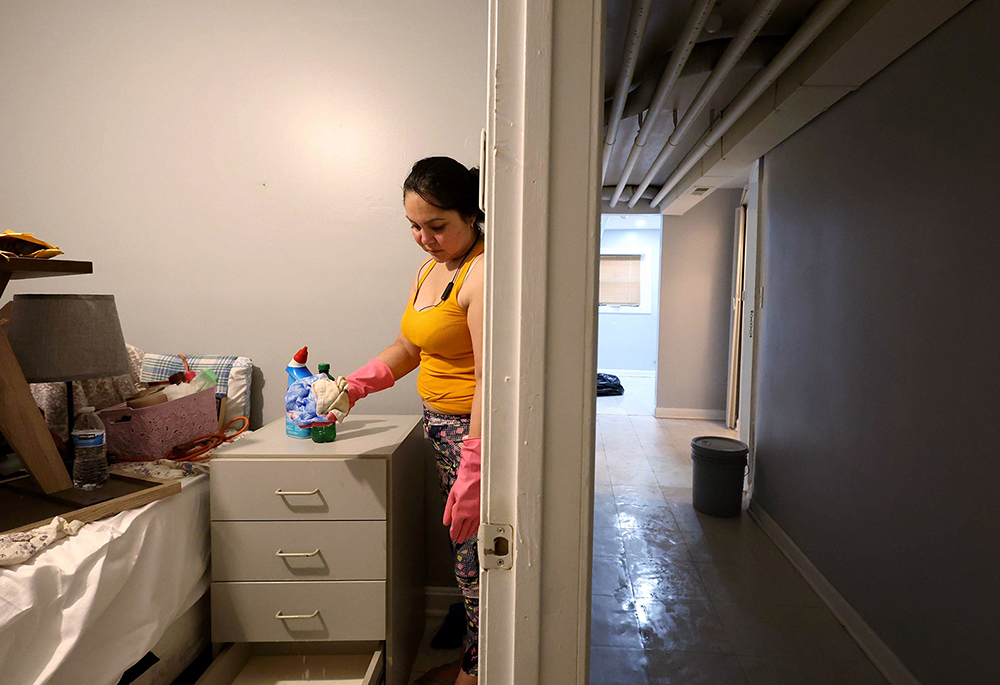
Patricia Medina cleans her flood-damaged apartment along the 1900 block of South 51st Court in Cicero, Illinois, on July 3, 2023. After the flooding, longtime residents of Cicero and Berwyn started a grassroots community organizing group to respond to the area's environmental concerns. (Stacey Wescott/Chicago Tribune/TNS)
In Cicero, a working-class neighborhood on Chicago's west side, devastating floods in July 2023 hit an area where residents already deal with environmental issues. Nearly nine inches of dirty water flooded people's homes when heavy rains backed up the area's infrastructure.
After that flooding, longtime Cicero residents Delia Barajas and Carmen Jimenez, and Johnny Reyes who lives in nearby Berwyn, started a grassroots community organizing group to respond to the environmental concerns that Cicero and Berwyn face: Voces Fieles Comunitarias Contra la Opresión (Faithful Community Voices Against Oppression).
"We organized this specific committee because of what we saw, what happened to our neighbors, friends and family members who were in the raw sewage," Barajas said. "People were suffering and didn't know what to do."
Barajas and Jimenez have lived in Cicero, a community of more than 82,000 people, for more than 25 years. They cite Pope Francis' 2015 encyclical "Laudato Si', on Care for Our Common Home" as an inspiration behind their decision to take action and start Voces in the wake of the flooding.
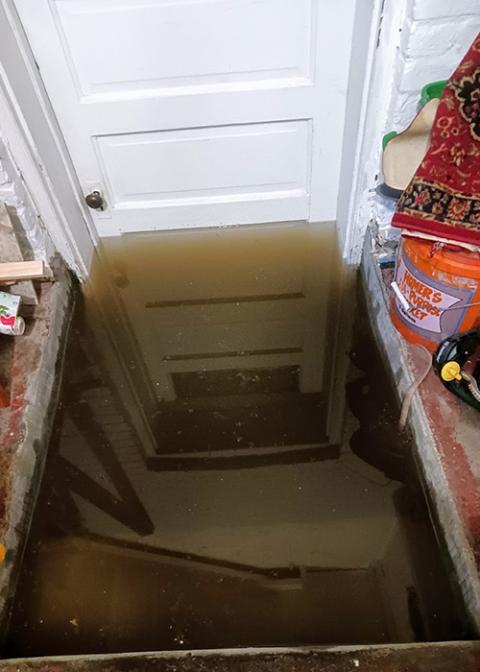
Flooding in a Cicero home residence in 2023 (Courtesy of Delia Barajas)
"I do this because of my faith and hope," Jimenez said. "People in the community wanted to do something, but many of them didn't know how. That is one of my inspirations, when I approach people and talk about what happened here. I live here in the community, and I've known for years the things that have happened. I would like to leave it a better place and to do the little that I can."
Berwyn and Cicero sit along the Chicago Sanitary and Ship Canal, with many industrial sites, storage yards and railways. The 2023 heavy rains caused about $100 million in damages in part due to Cicero's combined sewer system — which uses the same pipes to carry rainwater runoff, domestic sewage and industrial wastewater — backing up.
As reported in In These Times, a town engineer explained at a July 2023 board meeting that the decades-old sewer system could not handle the nine inches of rain in six hours. CBS News Chicago also reported comments about infrastructure management: a Cicero spokesman blamed the Metropolitan Water Reclamation District for opening drainage lines late, while a district spokesman said they had to wait until the Chicago River rose to a specific level.
Former President Joe Biden approved making Federal Emergency Management Agency funding available to those affected by the flooding who live in Cook County (which includes Cicero and Berwyn). At that time, Voces took on educating neighbors about applying for FEMA funds because many people didn't know how.
"There's a lot of undocumented folks that live here in Cicero, and we know that undocumented folks cannot apply for FEMA," Barajas said.
Barajas said they aren't sure how FEMA funding in Cicero will be impacted by changes to immigration policy and FEMA under the Trump administration.
In addition to flooding, Voces also helps Cicero community members address other environmental issues their neighborhood faces, including air quality concerns. The group organizes and educates through meetings, infographics and flyers.
"It's important for us to go to churches or whoever will host us to let people know what is happening," Barajas said. In addition to group meetings at places like churches, Voces utilizes "old-school" organizing techniques, with one-to-one relational meetings, Barajas said, during which an organizer sits down with a neighbor, fellow parishioner or community member to hear their story and what concerns them, particularly in regards to environmental justice issues. For fellow Catholics, Barajas and Jimenez have used Laudato Si' as a starting place.
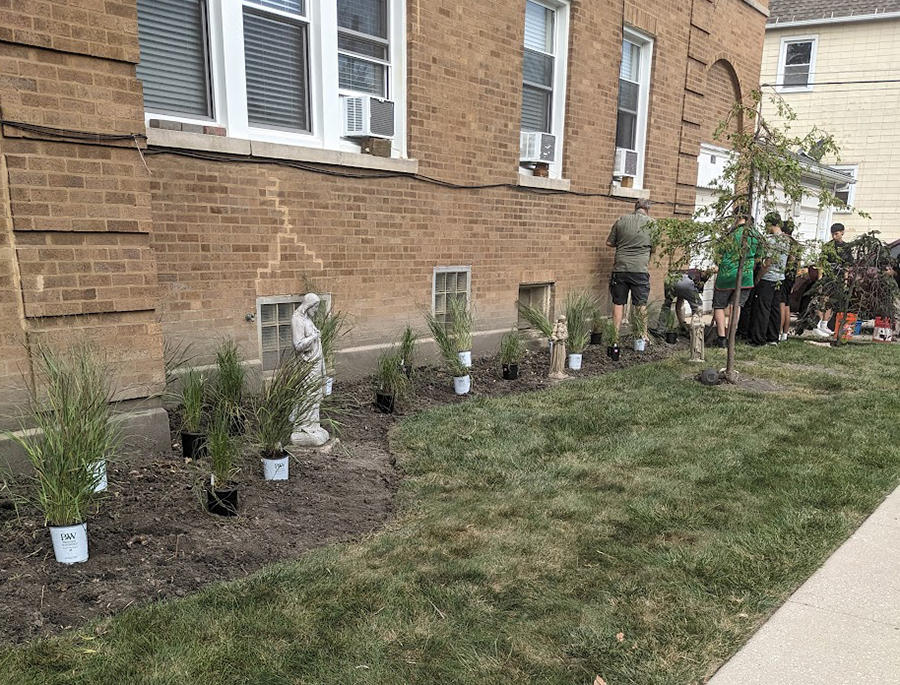
Members of Voces Fieles Comunitarias Contra la Opresión (Faithful Community Voices Against Oppression) have worked on phytoremediation projects, such as planting rain gardens, at churches and homes in Cicero, Illinois. They are pictured with their work on Aug. 24, 2024. (Courtesy of Delia Barajas)
Sasha Adkins, a scientist who teaches environmental health sciences at University of Massachusetts Amherst, is also part of Voces as a researcher and public health expert. At the time she got connected with Voces, she was teaching at Loyola University Chicago and has connected her students to the Cicero community to study environmental justice there.
One concern to the community is Koppers, a coal tar plant in Cicero that has operated for more than 100 years, which emits hazardous materials into the air, according to reporting by the Cicero Independiente and MuckRock. The outlets report that Koppers has repeatedly been accused of violating environmental laws at the state and federal levels.
According to the outlets, Koppers releases the chemical compounds naphthalene, used in pesticides, and benzene, which people are exposed to through gasoline fumes. The Environmental Protection Agency lists bezene as a carcinogen and naphthalene as a possible carcinogen.
Koppers did not reply to a request for comment.
Voces has taught people how to write letters to the Illinois Environmental Protection Agency about Koppers. Last June, they held an event at St. Frances of Rome Catholic Church for people who experienced flooding, which included education about the hazards posed by living near Koppers.
At this meeting, Voces introduced the community to their phytoremediation efforts, a method of using plants to clean up contaminated environments. Voces received a grant from the National Fish and Wildlife Foundation's National Coastal Resilience Fund to help support their phytoremediation work. Barajas and Adkins said the phytoremediation gardens are a way to address the cumulative impact of toxins in Cicero.
Rain gardens they are planting include switchgrass and fox sedge that can absorb heavy metals and chemicals — such as polycyclic aromatic hydrocarbons, or PAHs, which appear in coal and gasoline — from the ground, water and air, so less of it can enter people's bodies. Recently a church and a few families in the neighborhood have planted phytoremediation rain gardens at their homes, "gradually spreading green infrastructure in Cicero," Adkins said.
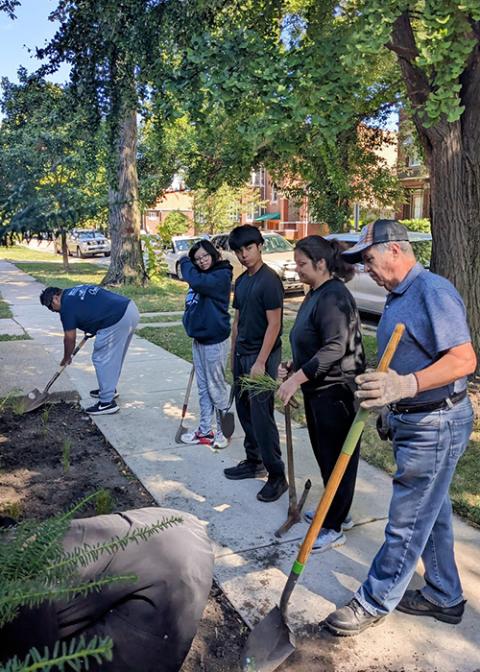
Members of Voces have worked on phytoremediation projects, such as planting rain gardens, at churches and homes in Cicero. They are pictured Sept. 7, 2024. (Courtesy of Delia Barajas)
In December 2024, Koppers announced that it will shut down its phthalic anhydride production, which is a chemical used in the plastics industry that is linked to various irritations and chronic ailments of the eyes, skin and lungs.
"We're hopeful that there will be some action to make sure that it actually diminishes the pollution," Adkins said, and that "it doesn't just substitute one kind of pollution for another."
One of Adkins' graduate students is looking at cancer data to verify if there is a cancer cluster in Cicero, and if cancer cases are elevated, which types, in which populations, and what it is in proximity to. Barajas said many families in the community have expressed concern about the possible increased risk of cancer living in Cicero.
"We all care for each other, our neighbors and people in our community," Barajas said, but she is concerned about the long-term impact beyond the capabilities of volunteers, who currently run Voces.
"Long-term recovery efforts should be led by the community itself because it's a community that knows what they want and what they need," she said. "But if it's all volunteer, how do we get things done?"
Still, the group shows no signs of slowing down anytime soon, with a number of projects currently in the works.
Advertisement
Recently, Voces provided input and co-developed an environmental justice policy that Cook County drafted. Barajas hopes to see people in Cicero and other Chicago communities that have been historically overburdened by pollution have more of a voice in policies like this.
Reyes has lived in Berwyn for 20 years and has experienced a lack of investment in the community.
"I hate to say it, but because Berwyn is a Black and brown community, I guess they figure we don't know anything," he said. In more affluent suburbs further west, he said, "They're looking at things like the environment, trees, grass and what you can put down. Information is given out to the community. And here, the only information we get is when a politician wants support."
This summer, Voces is working with Thriving Earth Exchange, a program that connects communities with scientists to confront climate change. They are creating a visual hydrological map to distribute to residents that details flood risks in the community, including information about exposure to flood-borne contaminants. A hydrologist through the University of Illinois is helping them create the map.
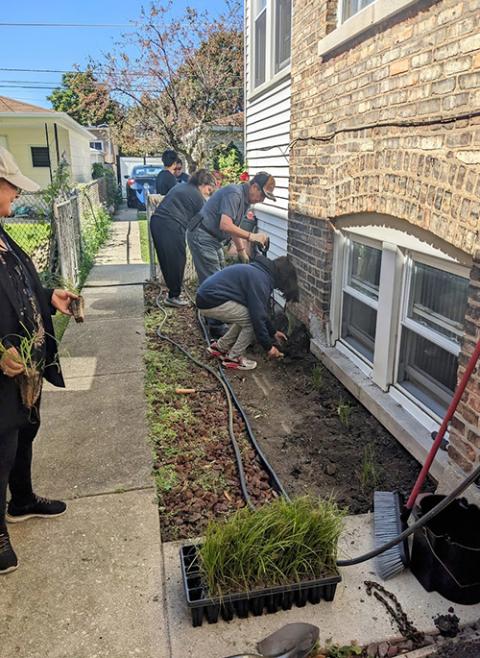
Members of Voces, including Martha Boise, at left, wearing a cap, have worked on phytoremediation projects, like planting rain gardens, at churches and homes in Cicero. (Courtesy of Delia Barajas)
Earlier this year, the Illinois General Assembly introduced the West Cook Flood Prevention District Act, which aims to manage the amount of water that comes into Cicero through connected sewer systems and beyond, in response to the 2023 flooding. In January, Cicero received a $96 million federal grant in part to address flooding challenges. The town has developed an action plan for the grant.
Voces is also creating story maps that will include information about what contaminants are being released in the air and in what quantities.
"We have some ideas based on what we know is being emitted and based on some environmental sampling, but we are still trying to figure that out," Adkins said. In addition to that data, they are also in the process of gathering stories, photos, quotes and videos to add to the maps.
Often, information about environmental hazards comes with "a lot of scientific jargon, which a lot of us do not understand," Barajas said. "That's why it's important for us to do story maps." After living in Cicero for 30 years, this will be the first time Barajas has seen a story map detailing environmental risks in an accessible way.
The map, she hopes, will serve as a conversation starter.
"Why do our kids have asthma? You live within feet of Koppers, which emits cancer. You live right next door to an open waste management facility, which includes medical supplies. People are breathing this with their children. What about all the toxic fumes that we breathe with the sewage and that comes into our homes? Nobody tells us these things. So once again, the burden is on us, the people. That is why I keep up with this type of work," Barajas said.
Another issue they are looking at with Thriving Earth Exchange is leaking underground storage tanks. These tanks are typically used to store hazardous substances and chemicals like petroleum and can be found underground at gas stations and industrial sites.
Voces is concerned about leaking tanks and the contamination of groundwater, Barajas said. There are hundreds of leaking tanks in the Chicago area, according to the Illinois EPA.
For Reyes, the challenges that have come with organizing — difficulties getting meetings with representatives, for example — makes the work "discouraging sometimes," he said. The moments that keep him inspired are ones like last summer, when he hosted a neighborhood meeting in his yard and delivered a presentation about initiatives for planting trees. People invited their friends and neighbors. "We're all learning about it together," he said.
What keeps Barajas organizing is her "faith in the Lord. We can't do this work without the Lord," she said. "My generation and older, we are the ones who have destroyed this Earth. It's the younger generation, my children and my grandchildren, that are suffering. You cannot just heal the Earth without healing the people as well." Barajas hopes more Catholics become involved in environmental justice efforts in their communities and that Voces can be an example of that.
Despite setbacks and disappointments in working toward environmental justice, "We all have to keep up the fight," Barajas said. "We want to make sure that folks are treated with equity, respected with dignity and not cut out of history. Even if you're discouraged, get up and let's continue the fight."




